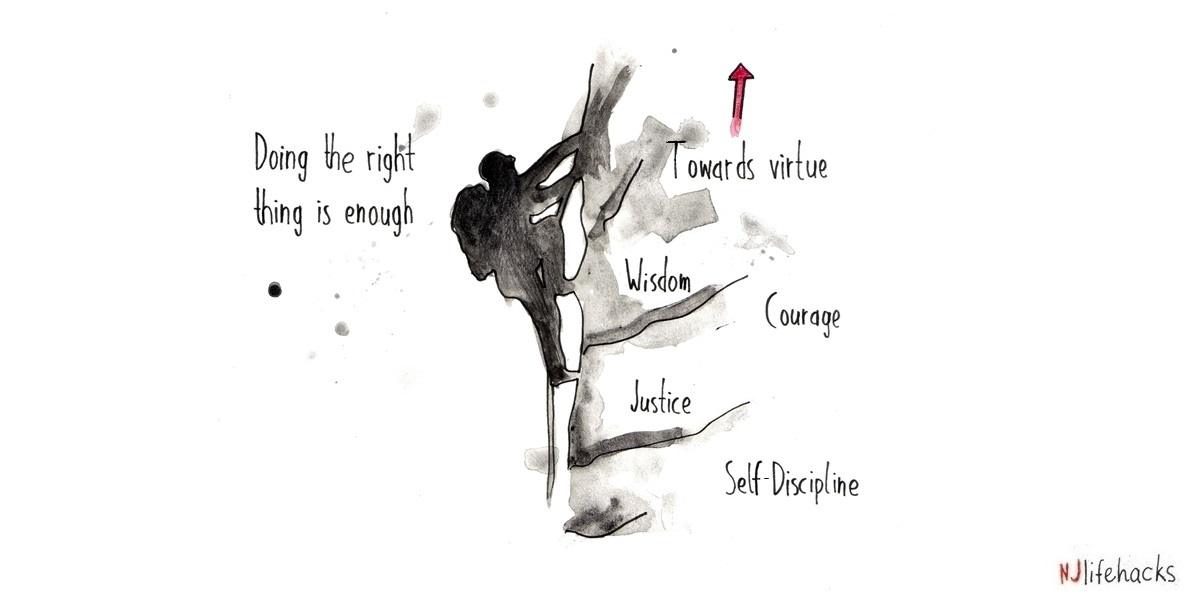Jon Brooks • • 21 min read
The Psychedelic Stoic: Navigate Bad Trips Using Ancient Philosophy

Most of the conventional psychedelic retreats I’ve attended have included elements of Eastern philosophy, namely Buddhism. We meditate, we do yoga, we eat mindfully, we talk about letting go and focusing on the now.
Rarely, however, do I see the ancient philosophy of Stoicism being used to help individuals get the most from their psychedelic experiences. This is a shame because Stoicism is a system for attaining enlightenment just like Buddhism, only with the advantage of ideas that make more intuitive sense to the Western mind.
Buddhism tends to focus more on gaining clarity into the conditions of consciousness itself, whereas Stoicism deals more with the contents of consciousness. Buddhism has you examine how thoughts arise in the mind, Stoicism has you question and redirect your thoughts using reason. Both are very useful, but Stoicism is massively underutilized in the psychedelic scene.
In this article, I will share 6 potent Stoic principles that can help you during difficult psychedelic experiences. These concepts have been indispensable to me in my own journey, and I have no doubt they will prove useful to you too.
But before I show you how to steer your ship to safety in a psychedelic storm, let’s look at some of the psychological mechanisms of a difficult psychedelic experience.
9 Traps That Can Happen in a “Bad Trip”
1. Your value system changes
You cannot see reality without a value hierarchy. If you don’t know what to value, you cannot differentiate the world into tools and obstacles. You are a baby infinitely overwhelmed by undifferentiated “stuff.” Our value systems are pretty consistent across time, and even if they change, the change is gradual. When you take psychedelics, however, you can get a very sudden shift in values. What you once loved, you may now suddenly despise. What you thought was not important now becomes the direction you want to take in life. When such a sudden shift happens, the same old world looks different, as if you are perceiving your world with someone else’s eyes. This sudden shift can be unsettling.
This video illustrates how your values influence your perception:
2. The invisible becomes visible
In a healthy functioning individual, most of the world is invisible. The thousand potential things that could go wrong at any given moment are only visible to the person with an anxiety disorder. The tiny micro-expressions of deceit we all make are only visible to the paranoid person. When we take psychedelics we may see so many things that were previously invisible and suddenly what was once insignificant can become radically meaningful. The realization that you have not been spending quality time with your mother, hits you in the gut and knocks you over.

3. Negative thought loops
The thinking mind is a wonderful tool if harnessed with wisdom, but it also has its limits. Take a look at wild nature. You don’t see mental health hospitals in forests. Thinking, and specifically the dreaded “negative thought loop” seems a uniquely human thing. What’s worse is that few of us are skilled at getting out of it, especially not during a psychedelic experience. We assume that we can think our way out of thinking, even though this rarely ever works.

4. Loneliness and feeling disconnected from others
When you are in the world of a difficult trip, you may feel more alone than you have ever felt in your entire life. I typically don’t feel lonely that often, but when I’m having a hard time with psychedelics I sometimes feel like nobody can understand what I’m going through or help me. This is of course a self fulfilling prophecy that creates separation from you and others.
5. Feeling trapped inside the experience
Taking psychedelics has similarities to entering into a simulation. You ingest a substance and embark on a journey where things are very different from the ordinary world. Because psychedelics have an unpredictable quality, you may end up entering into world you soon wish to leave. When this happens, you may feel stuck. Things are familiar, yet strange. You just want to go home, and then you realize to your dismay, you already are.

6. Disturbing images
If I tell you not to think of a grotesque demon right now, you will have a hard time doing so. But I highly doubt this will cause you that much grief. On psychedelics, imagery can be more intense—more emotionally impactful, more ripe with meaning. What a sober mind experiences as a fleeting image, the suggestible psychedelic mind might see a demon that lingers and stares back.

7. Fear of the unknown future
It’s possible that your psychedelic trip may contain many sub-acts in the larger story arc. When you come out of one mini-process you may start a new one which has an entirely different emotional tone. This can create a strange fear of the future during the trip. You may find yourself in a good place, yet have some slight anxiety about that good state being disrupted. You may also find yourself having a difficult time and worrying that things will get worse if you don’t do something.
8. Strange physical sensations
When you take psychedelics your entire relationship to your body may change. You may not even be able to feel certain parts of your body. Your spacial awareness may alter. You may experience synesthesia, tingling in your hands, tightness in your breath, anxiety in your stomach. There’s no saying what you can experience, and while psychedelics are very safe when done mindfully, you may still experience some resistance to these unusual sensations.

9. Loss of trust in the process
This one may be one of the most serious. Nietzsche said “He who has a why to live can bear almost any how.” This is one of the reasons a strong intention is so useful for working with psychedelics. If you have a strong enough reason, nearly any difficult experience can be seen as part of the path that gets you to where you want to be. But what can sometimes happen is that when on psychedelics, you lose trust in the journey you are on. You may doubt that it is in fact doing you any good, and maybe you should have listened to your concerns that “psychedelics aren’t for everyone.”
~
There are a myriad of things that can happen in a difficult trip, but those are the main ones from my own explorations. The rest of the article will provide a Stoic antidote to these traps.
The Limits of Modern Stoicism
Tim Ferriss and Ryan Holiday played pivotal roles in re-popularizing Stoicism, and to make modern stressed individuals connect with this philosophy, it has been marketed as a psychological toolkit to help calm anxiety and cultivate resilience. While this is certainly a good entry point into the philosophy, there is so much more depth to this ancient blueprint.
If you imagine a modern person practicing Stoicism, you might picture someone waking up and imagining the difficulties that lie ahead (premeditation of adversity), attempting not to get upset about the things they cannot control (dichotomy of control), doing some uncomfortable things (voluntary discomfort), and then finishing the day with journaling (evening reflection).
Make no mistake, there will be lots of benefit if you do these Stoic techniques (I outline many specific techniques in The Stoic Quest), but the problem is, unless you understand the context properly, you will not derive maximum benefit. Stoicism is a set of techniques, embedded inside a frame of existence. The techniques are optional ways to connect to a wiser perspective, but the Stoic framing of reality is primary.
It can be useful in the beginning to view Stoicism in a religious light. It is not that Stoicism asks you to believe in anything with blind faith, but ironically because Stoicism will ask you think so reasonably about life it may require a leap of faith to even summon the will to contemplate ideas that are so outside your normal, irrational frame of reference.
For this reason, the French philosopher Pierre Hadot used the phrase “Stoic conversion” when describing the adoption of the Stoic way of life. To convert signifies a fundamental shift in form. Practicing surface level techniques can help us, but what we are really seeking is passage into a new world.
When it comes to working your way through a difficult psychedelic experience, no technique will be able to save you from yourself, and may even make things worse. Instead, I’ve opted to provide maxims that come with an explanation. Maxims are succinct, potent thoughts that Stoics were fond of using. You can memorize them and think of them when times get difficult to help you through. With enough practice, the term “bad trip” may cease to exist.
Neo:
What are you trying to tell me? That I can dodge bullets?
Morpheus:
No, Neo. I’m trying to tell you that when you’re ready, you won’t have to.
6 Potent Stoic Thoughts to Help You Navigate Difficult Psychedelic Experiences
1) There is nothing good or bad other than our intentions.
Our ability to categorize and label things with language plays a huge role on how we color reality. When someone asks you how your day is going, you are forced to dive into the complex emotional field in your body and drag out an answer that falls roughly into one of the categories of “good”, “bad”, or “neutral.”
Most of us, due to our negative-emotion shame, will opt to tell people things are good, even when we are actually suffering. One of the first Stoics, or at least a huge inspiration for Stoic philosophy, was Socrates—a man who was famed for asking deep questions about parts of life to which we don’t give much attention..
Socratic questions might include things like:
- What is the nature of good?
- What is the nature of bad?
- What is a good person?
- What is wisdom?
The Stoics continued this way of using reason to make sense of the world and their answers informed their philosophy.
To a Stoic, the external world is neither good nor bad. The external world is indifferent or neutral. The only good thing to a Stoic is virtue, and the only bad thing is vice. This view of reality is fundamental to having a Stoic conversion.
Virtue from a Stoic standpoint essentially means good character or embodied wisdom. Virtue can be broken down into courage, self-discipline, justice, and acting with reasoned judgement. Vice on the other hand would include folly, delusion, cowardice, injustice, profligacy, etc. Traits one might associate with a wisdom deficit.

You may argue with this idea. Isn’t having money and health good, and isn’t being sick and poor bad? The Stoics had a problem with this argument because you can be sick and poor and still practice wisdom and good character (virtue), and conversely you can be rich and healthy and be a more effective serial killer (vice).
The Stoics did subdivide the external “indifferents” into two subcategories: preferred and dispreferred. It is preferable to have good health over bad health, but it is still neither good nor bad.
Here you may ask, well what if someone does something bad to me like punch me for no reason? How can you say that is not bad? Well the answer is that it is bad… bad for them. If a person acted with bad intentions, they were practicing vice instead of virtue. They acted badly. But from the vantage point of the “victim,” the focus would fall on how we might respond to the event rather than to ruminate on that over which we have no control, past or present. Furthermore, many of us would not take back our difficult past experiences, for they made us a better, wiser person. Pain can be a great teacher.
In the end it is how we respond, what intention we bring to life that counts. Modern Stoic and concentration camp survivor Viktor Frankl said:
Between stimulus and response there is a space. In that space is our power to choose our response. In our response lies our growth and our freedom.
Epictetus millennia before stated:
“It’s not what happens to you, but how you react to it that matters.”
Psychedelic Application: If we’re experiencing difficulty it’s very easy to begin to conjure a victim mentality and a poor-me narrative. This will surely only make your experience even more difficult. Challenge the notion of being a victim. How do you know what you’re experiencing is bad? Perhaps it’s exactly what you need. Focus on virtue: your capacity to respond and work with whatever arises. Even in the most challenging psychedelic trip, we can also reconnect to our intention. We know why we entered into this experience, we know we did so to better ourselves, to become wiser and more virtuous. This is good, and any feeling that comes up or situation that comes up is indifferent. All that matters is our intention to become wiser, and the experience that we are in will definitely help us with that aim. For this reason, do away with any labels of good or bad.
2) Hardship is the key that unlocks virtue.
“Difficulty shows what men are. Therefore when a difficulty falls upon you, remember that God, like a trainer of wrestlers, has matched you with a rough young man. Why? So that you may become an Olympic conqueror; but it is not accomplished without sweat.”
— Epictetus
Question: If you practice Stoicism well, you will never feel fear, temptation, anxiety, depression, loneliness, and anger, right?
Absolutely not.
While the Stoics seemed to have cultivated superhuman levels of tranquility, make no mistake, they struggled with their emotions as much as the rest of us—at least during their Stoic training.
How could they have not? Marcus Aurelius had fourteen children, and only six of them survived into adulthood. He was the Emperor or Rome, and was almost constantly at war. Epictetus grew up as a crippled slave. Seneca almost killed himself in his early twenties due to a life-denying illness that lasted years. He was also exiled multiple times, losing all his wealth. (Learn more about individual Stoics superheroes here.)
The reason the Stoics are so knowledgeable about topics like anger and anxiety is because they experienced them… a lot! Why else would Seneca have written an entire book on anger if he had not experienced the dangers of this emotion firsthand.
Many of us on our journey to becoming better, wiser, healthier people can’t help but equate positive emotion with success. What good is our spiritual practice if we don’t feel better than everyone else around us? On the flip-side, we feel shame around feeling low. How embarrassing to have read so many books, to study philosophy, to listen to inspirational speeches, to meditate, and feel “just okay” for our efforts.
The Stoics being the wise folk they were did not seek to rid themselves of all negative emotions, because this aim would be foolish. The Stoics recognized that many emotions are involuntary, caused by a sudden shift in the environment or by an unconscious pattern that we internalized long ago. The Stoics didn’t worry too much about these knee-jerk feelings. Instead, they told their students to put all their focus on their judgment about the emotion—the part of our experience which we have some control over.
Viewing our emotional life in this way gives us the opportunity to use all difficult experiences as practice for virtue. We cannot practice self-discipline unless we are tempted; we cannot practice courage unless we are afraid; we cannot call ourselves truly honest unless we see a benefit to being dishonest.
Epictetus writes:
“For every challenge, remember the resources you have within you to cope with it. Provoked by the sight of a handsome man or a beautiful woman, you will discover within you the contrary power of self-restraint. Faced with pain, you will discover the power of endurance. If you are insulted, you will discover patience. In time, you will grow to be confident that there is not a single impression that you will not have the moral means to tolerate.”
Psychedelic Application: If you find yourself in a challenging psychedelic trip, be thankful that you are being given the chance to display virtue. Endurance, patience, and aiming to remain calm in stressful times are abilities that can only be sharpened when everything tempts us to do the opposite. Plant medicine has a way of figuring out exactly where your areas of weakness are and showing them to you. When this happens, you can thank the fear and difficult emotions that come up, and allow your unconscious mind to pull out the required resources to strengthen itself in the face of this adversity.
3) Do not expect good things without paying the price.
All acts of surrender or “letting go” are difficult because they require the relinquishment of control. It is equivalent to jumping into a cold pool. When you’re in the pool, it’s not so difficult, your body takes over and stabilizes your temperature. The difficulty is contained in the jump. The part where you propel yourself into the air is the letting go.
Once when I was working with the Mother Vine, I found myself having a difficult time and asking, why? The answer came to me very clearly. Peace and happiness is right here for you if you wanted it, but you don’t. I wanted the vitalizing benefits of splashing around in the cool pool without being willing to jump in. I wanted to experience ecstasy without jumping through its doorway of fear.
Many of us like to complain about things for which we have not done the required work to obtain:
“She is so perfect!” But do you strive to be perfect? Do you pay that price?
“He is so fit and strong?” But do you strive to be fit and strong? Do you pay that price?
“That person is so popular!” But do you act to become popular? Do you pay that price?
All benefits come at a price, as Epictetus states in his handbook:
“How much is a head of lettuce worth? One obol, perhaps? Now if someone pays an obol and gets the head of lettuce, while you will not pay this much and therefore go without, don’t imagine that you necessarily come off second best. As he has the lettuce, you still have the money. And it’s much the same in our case. You were not invited to someone’s party, because you wouldn’t pay the host the price of admission, namely paying her court and singing her praises. So pay the bill, if you expect to gain by it, and give no further thought to the expense. But if you won’t pay the bill and still want the benefits, you are not only greedy but a fool. If you forgo the meal, however, must it mean that you leave empty-handed? You have the advantage of not having to praise the host, which you find disagreeable (and won’t have to put up with the insolence of his slaves).”
Remember this the next time you feel dissatisfied.
Psychedelic Application: Before a psychedelic experience, it’s important to prepare. You may want to follow a certain kind of self-care plan, paying attention to diet and the influences around you. If you don’t prepare adequately, then you can’t really complain if things get a little bit rocky because you didn’t pay the price of admission. If you do prepare well, and you find yourself in a difficult psychedelic experience, consider if you have paid the price to get through to the other side. Have you actually taken the leap of surrender? Pain and love are separated by a chasm of fear. Bridging the gap is a choice you have to be willing to make. You can’t resist the medicine and expect the cure.
4) View your difficulties from above.
Have you ever watched a film where “bad” things keep happening to the main characters, but it’s comical rather than tragic? A film I love is Trains, Planes, and Automobiles. In the film the character played by Steve Martin is trying to get home to his wife and kids for Christmas but keeps running into incredibly frustrating obstacles. It’s hard not to laugh as you see him encounter situations we’ve all been in ourselves. What’s odd, though is that if we were going through this ordeal instead of him, we would not find the situation funny at all.
When we see drama from the third-person perspective, with distance, we feel less identified with it. We see the difficulties from above and put them in perspective. Conversely, when we attach a “self” to a problem, we experience that problem much more intensely. When our ego encounters rejection we ask, “What does this mean about us?!” When we see someone else get rejected, we laugh and say, “Rejection is just part of life.”
Marcus Aurelius wrote in his Meditations:
Watch and see the courses of the stars as if you were running alongside them, and continually dwell in your mind upon the changes of the elements into one another … When you are reasoning about mankind, look upon earthly things below as if from some vantage point above them.
This Stoic form of cognitive distancing was formalized into a technique called “The View From Above” by Pierre Hadot. He wrote:
Philosophy in antiquity was an exercise practiced at each instant. It invites us to concentrate on each instant of life, to become aware of the infinite value of each present moment, once we have replaced it within the perspective of the cosmos. The exercise of wisdom entails a cosmic dimension. Whereas the average person has lost touch with the world, and does not see the world qua world, but rather treats the world as a means of satisfying his desires, the sage never ceases to have the whole constantly present to mind. He thinks and acts within a cosmic perspective. He has the feeling of a whole which goes beyond the limits of his individuality.
Each of us has the ability to zoom out of our current life situation and see it as a part of nature, as a part of the indifferent cosmic happenings. The Stoic perspectives may not solve our earthly problems, but they may dis-solve them.

Psychedelic Application: If you find yourself stuck inside a difficult experience, why not zoom out and visit the moon or the stars? Why not imagine the hundreds of thousands of people who have felt just like you feel right now since the dawn of psychedelics, and how many got through the experience and were thankful for it. Where are you positioned right now in the vast universe? How serious is your emotional state right now, really? Prompt yourself to zoom out and feel the beautiful vastness of the life outside of your small whiny ego.
5) Do not add anything to first impressions.
Cognitive Behavioral Therapy was greatly inspired by Stoic philosophy. Clinical psychologist and Stoicism author Donald Robertson actually wrote a book called The Philosophy of Cognitive Behavioral Therapy, where he goes into great detail on the overlap.
The premise of CBT is that our irrational thoughts dictate our moods, and to change our moods we should challenge our thoughts. Some classic examples of distorted thoughts include:
- Mind reading: We look at someone else’s behavior and believe we know exactly what they are thinking, and usually it’s not good. In truth we are quite bad at reading people.
- Fortune telling: We believe we know what will happen in the future and it’s usually not good. In truth, we are often wrong about the future and our thinking shapes it to a large degree.
- Catastrophizing: We make things much more severe and scary than they actually are. If you feel a tingle in your left hand you must be having a heart attack. In truth, things are rarely as bad as they seem.
Stoicism also had their own systems for dealing with disturbing thoughts, but we have lost access to the complete methodology through the ages. Now we must look to the great Stoic authors to uncover the principles.
One such gem can be found in this paragraph by Marcus Aurelius:
Do not say more to yourself than the first impressions report. You have been told that someone speaks evil of you. This is what you have been told; you have not been told that you are injured. I see that the little child is ill; this is what I see, but that he is in danger I do not see. In this way then abide always by the first impressions and add nothing of your own from within, and that’s the end of it.
A few months ago, I came home at 9PM and asked my father where my mother was. He said he didn’t know. She should have been home 3 hours ago. I picked up my phone and rang her. No answer. She hadn’t replied to my last text for hours. my father and I started worrying. We called our other family members. Nobody had seen her. I went out to the train station to look for her. I saw an umbrella in the dark street. I knew she carried an umbrella. I started to panic. Has something happened to her? Has she been mugged. I rang her again and no answer. We started calling everyone. I returned home. Then my dad calmly told me that she was over my grandmother’s house.
This was a great example of adding to first impressions. My mother was not home and was not answering her phone. The statistical likelihood that she was out shopping or visiting family was significantly higher than her getting mugged or hurt, and yet my mind assumed the worst. Life becomes much more enjoyable (and realistic) when you stop adding narratives to your first impressions. “This happened, and that’s all I know right now,” is a very wise thought indeed.
Psychedelic Application: In my last ceremony working with Mother Aya, I had intense waves of emotions as the medicine hit me. As soon as a wave came, I added to the sensation thoughts like…
– This is too strong, I won’t be able to handle it
– I may pass out due to the shock my body is going through
– This medicine is making my breath weird. I’m not breathing right
– I’m going to have to call the Shaman over and I’ll look stupid
As soon as these thoughts arose, I simply told myself to wait a little bit. I don’t really know what’s going on or what will happen in 2 minutes from now. It’s a wave of sensation, that’s what I know. That’s all I know right now. Repeatedly reminding myself of what I know right now had a very calming effect and none of my fears came true. Not only could I handle the intense waves of medicine, I actually started to enjoy them.
6) Realize your own power to fall in love with this very moment.
Don’t seek to have events happen as you wish, but wish them to happen as they do happen, and all will be well with you.
— Epictetus
In June 2018, I went on a luxury plant medicine retreat in Rythmia, Costa Rica. On ceremony two of four, I drank two cups of brew and started to feel it come on very strongly. My whole body became a surging energy field and I wanted it to stop—I was resisting. I wriggled around on the floor like a contortionist, hoping the waves would stop, but they didn’t. My whole experience became an episode of waiting for the effects to wear off. I wasn’t seeing visuals, I was overwhelmed by the strangeness of my perception and I wanted out. I dug deep and started fighting, enduring, waiting. Nothing would make it go away. No blessings from the Shaman, no change in song choice, no different body position.
What eventually snapped me out of my difficult experience was a thought. In the midst of my suffering and resistance, I asked myself the following question:
“If you were someone who was never born, never had any experience of anything ever, a Being stuck for eternity in nothingness, how grateful would you be just to experience what you’re going through right now, even for a few minutes? How fascinating this world of perception is.”
In an instant, I went from resisting the moment to falling in love with it. Then many lessons started erupting from within and I cried with immense gratitude.
The Stoics recognized that gratitude is one of the keys to living the good life. The pursuit to acquire all the things we don’t have but want will likely cause us great suffering. A better idea is to train our mind to want exactly the things we already have as Epictetus advocates:
“He is a wise man who does not grieve for the things which he has not, but rejoices for those which he has. ”
The Stoics often contemplated losing the things they own but take for granted so they could rediscover their true worth. Epictetus even encouraged us to contemplate losing our own children as we tuck them in at night. This is at first a morbid thought, but the intended effect is incredibly sentimental: we should never waste a minute with our loved ones by getting distracted by things of lesser value.
Nietzsche’s term amor fati, which can be translated as “love of one’s fate” is a development of this Stoic idea. If externals are not under our control, but our intentions are, why not set the intention to find something we love in each moment? This, as Nietzsche says, is a “formula for greatness.” And there are few better ways to truly own your life.
Psychedelic Application: If you are going through a difficult psychedelic experience, try and tap into how lucky you are to be experiencing anything at all. What can you find right now in your perceptions to be grateful for? Billions of people don’t have clean drinking water but you are able to experiment with your consciousness. What a gift to be alive. Realize your own power to fall in love with every moment. Consciousness is the most beautiful thing in the entire universe, regardless of the contents.
Applying These Stoic Ideas In Daily Life
Each of these maxims can make a world of difference if you’re faced with a difficult psychedelic journey.
But this article isn’t really about psychedelics. Perhaps the strangest trip we’re all on is life itself.
I used psychedelics as a frame to explore because many of may us encounter extreme intensity and massive uncertainty when we use plant medicines but these entheogenic substances are only revealing a pervading truth the sober mind tries its best to iron out: life is uncertain and intensity is right around the corner.
If you were experiencing a break-up, a job transition, a death in the family, or any other kind of real-world crisis, these principles would all apply. That is one thing I love so much about Stoicism: its universal application. We live in a time of a high-speed technomagic. It’s like a different planet from the one the Stoics inhabited and yet somehow this philosophy is just as relevant today as it was when it was first devised.
But reading about it isn’t enough. Yes, Stoicism is a robust psychological operating system that can armor one’s soul against the harshness of life. But to benefit one must put these words into action. Otherwise, they simply remain as a cute assortment of mental gymnastics.
I created the Stoic Quest as an 8-part path to embodying this ancient blueprint for emotional mastery. It includes workshops, challenges, and meditations designed to help you absorb the above principles (and many more) into your natural way of being.
The doors to the Stoic Quest will open soon for a small group of committed individuals. If you haven’t yet added yourself to the early invite list, click here.
Tomorrow for Day 3 of Stoic Week you’ll get to listen to a new HighExistence podcast episode on Gamifying Stoicism so you can learn more about applying these principles to your daily life.

Jon Brooks
Jon Brooks is a Stoicism teacher and, crucially, practitioner. His Stoic meditations have accumulated thousands of listens, and he has created his own Stoic training program for modern-day Stoics.


![Seneca’s Groundless Fears: 11 Stoic Principles for Overcoming Panic [Video]](/content/images/size/w600/wp-content/uploads/2020/04/seneca.png)







